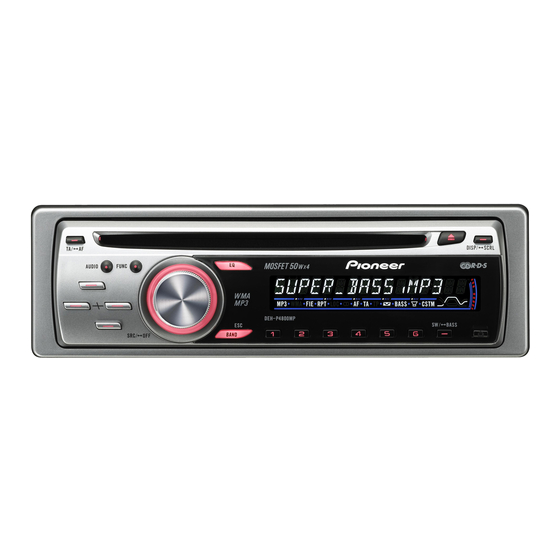Pioneer DEH P4800MP Betriebshandbuch - Seite 34
Blättern Sie online oder laden Sie pdf Betriebshandbuch für Auto-Empfänger Pioneer DEH P4800MP herunter. Pioneer DEH P4800MP 36 Seiten. Multi-cd control high power cd/mp3/wma player with rds tuner

MAN-DEH-P4800MP-GB.fm Page 34 Thursday, September 29, 2005 11:55 AM
Additional Information
MP3
MP3 is short for MPEG Audio Layer 3. It is an audio compression standard set by a
working group (MPEG) of the ISO (International Standards Organization). MP3 is able
to compress audio data to about 1/10th the level of a conventional disc.
MS ADPCM
This stands for Microsoft adaptive differential pulse code modulation, which is the
signal recording system used for the multimedia software of Microsoft Corporation.
Multi-session
Multi-session is a recording method that allows additional data to be recorded later.
When recording data on a CD-ROM, CD-R or CD-RW, etc., all data from beginning to
end is treated as a single unit or session. Multi-session is a method of recording more
than 2 sessions on one disc.
Number of quantization bits
The number of quantization bits is one factor in the overall sound quality; the higher
the "bit-depth", the better the sound quality. However, increasing the bit-depth also
increases the amount of data and therefore storage space required.
Packet write
This is a general term for a method of writing on CD-R, etc., at the time required for a
file, just as is done with files on floppy or hard discs.
VBR
VBR is short for variable bit rate. Generally speaking CBR (constant bit rate) is more
widely used. But by flexibly adjusting the bit rate according to the needs of audio
compression, it is possible to achieve compression-priority sound quality.
WAV
WAV is short for waveform. It is a standard audio file format for Windows
WMA
WMA is short for Windows Media™ Audio and refers to an audio compression
technology that is developed by Microsoft Corporation. WMA data can be encoded by
using Windows Media Player version 7 or later.
Windows Media and the Windows logo are trademarks or registered trademarks of
Microsoft Corporation in the United States and/or other countries.
Specifications
General
Power source ..... 14.4 V DC (10.8 – 15.1 V allowable)
Grounding system .................................. Negative type
Max. current consumption ................................. 10.0 A
Dimensions (W x H x D):
DIN
Chassis ................................. 178 x 50 x 157 mm
Nose ....................................... 188 x 58 x 19 mm
D
Chassis ................................. 178 x 50 x 162 mm
Nose ....................................... 170 x 48 x 14 mm
Weight ................................................................ 1.3 kg
Audio
Maximum power output ................................. 50 W x 4
50 W x 2/4 $ + 70 W x 1/2 $
Continuous power output .............................. 27 W x 4
(DIN 45324, +B=14.4 V)
Load impedance ........................................ 4 – 8 $ x 4
4 – 8 $ x 2 + 2 $ x 1
Preout max output level/
output impedance ................................ 2.2 V/1 k$
Equalizer (3-Band Parametric Equalizer):
Low
Frequency ................................ 40/80/100/160 Hz
Q Factor ................................. 0.35/0.59/0.95/1.15
(+6 dB when boosted)
Gain .......................................................... ±12 dB
Mid
Frequency ................................. 200/500/1k/2k Hz
Q Factor ................................. 0.35/0.59/0.95/1.15
(+6 dB when boosted)
Gain .......................................................... ±12 dB
High
®
.
Frequency ......................... 3.15k/8k/10k/12.5k Hz
Q Factor ................................. 0.35/0.59/0.95/1.15
(+6 dB when boosted)
Gain .......................................................... ±12 dB
Loudness contour:
Low ................. +3.5 dB (100 Hz), +3 dB (10 kHz)
Mid ................ +10 dB (100 Hz), +6.5 dB (10 kHz)
High ............... +11 dB (100 Hz), +11 dB (10 kHz)
HPF:
Frequency ........................... 50/63/80/100/125 Hz
Slope .................................................. –12 dB/oct
Note
• Specifications and the design are subject to possible modifications without notice due to
improvements.
Subwoofer:
Frequency ........................... 50/63/80/100/125 Hz
Slope .................................................. –18 dB/oct
Gain .................................................. +6 – –24 dB
Phase ......................................... Normal/Reverse
Bass boost:
Gain .................................................... +12 – 0 dB
CD player
System ............................. Compact disc audio system
Usable discs ........................................... Compact disc
Signal format:
Sampling frequency ............................... 44.1 kHz
Number of quantization bits ................... 16; linear
Frequency characteristics ........ 5 – 20 000 Hz (±1 dB)
Signal-to-noise ratio ............................... 94 dB (1 kHz)
(IEC-A network)
(for subwoofer)
Dynamic range ....................................... 92 dB (1 kHz)
Number of channels ..................................... 2 (stereo)
MP3 decoding format ....... MPEG-1 & 2 Audio Layer 3
WMA decoding format .................. Ver. 7, 7.1, 8, 9, 10
(2ch audio)
(Windows Media Player)
WAV signal format ............ Linear PCM & MS ADPCM
FM tuner
Frequency range ............................. 87.5 – 108.0 MHz
Usable sensitivity .......................... 8 dBf (0.7 µV/75 $,
mono, S/N: 30 dB)
50 dB quieting sensitivity ..................... 10 dBf (0.9 µV/
75 $, mono)
Signal-to-noise ratio ................. 75 dB (IEC-A network)
Distortion ................... 0.3 % (at 65 dBf, 1 kHz, stereo)
0.1 % (at 65 dBf, 1 kHz, mono)
Frequency response .............. 30 – 15 000 Hz (±3 dB)
Stereo separation .................. 45 dB (at 65 dBf, 1 kHz)
Selectivity ......................................... 80 dB (±200 kHz)
MW tuner
Frequency range ................... 531 – 1 602 kHz (9 kHz)
Usable sensitivity .......................... 18 µV (S/N: 20 dB)
Signal-to-noise ratio ................. 65 dB (IEC-A network)
(volume: –30 dB)
LW tuner
Frequency range .................................. 153 – 281 kHz
Usable sensitivity .......................... 30 µV (S/N: 20 dB)
Signal-to-noise ratio ................. 65 dB (IEC-A network)
34
